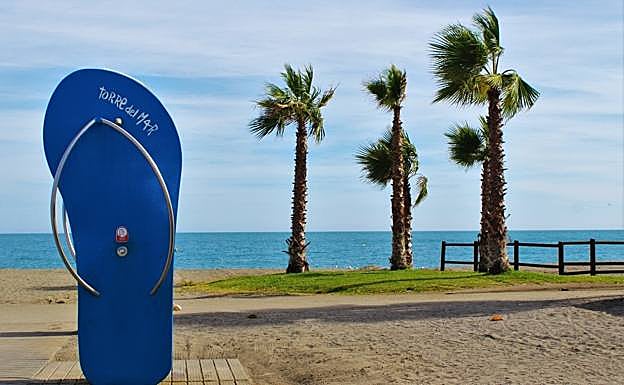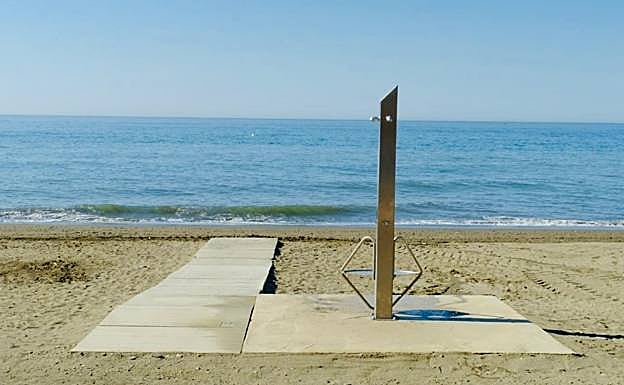
Three towns on the eastern Costa del Sol turn off beach showers to save water
Rincón de la Victoria and Vélez-Málaga will only leave the footbaths in operation in view of the critical level of the La Viñuela reservoir, which is currently at 12.8 per cent capacity
Barring a miracle in the form of abundant rainfall in August or September, La Viñuela reservoir is on course to repeat its worst ever scenario, recorded on 31 October 2008, when it reached just 9.2 per cent of its capacity. Last Friday it registered 12.8 per cent. At the current rate of consumption, the figure of 14 years ago will be reached by the end of September.
Following the call made last week by the Mancomunidad de Municipios of the Eastern Costa del Sol for the 31 town halls of the Axarquía to make savings of at least 20 per cent of their water use, Rincón de la Victoria, Vélez-Málaga and Algarrobo have turned off the showers on their beaches as of today, Monday 1 August, leaving only the footbaths in the first two cases. Algarrobo will only have running water in its public toilet facilities.
The Mayor of Vélez-Málaga, Antonio Moreno Ferrer, said: "It is not easy to take this decision in the middle of summer and with the beaches full, and we regret the inconvenience that this may cause, but we really are facing a critical situation and any measure that can help alleviate the effects of drought should be carried out, starting by setting an example from the local administrations."
Desalination plant
Ferrer stressed that they have been working for "some years" on the project for the installation of a desalination plant in the town, which in his opinion, "is key to obtaining greater water resources and to offer a definitive solution to the water shortage in our town and Axarquía, and we are confident that we can count on European funds and the support of private investment and the supra-municipal administrations to make it a reality.”
The idea is that the desalination plant can respond to both domestic use and the food industry in the area, "as this is an important economic engine in Vélez-Málaga and the region" Ferrer said, adding that while that is a reality, "we must start applying any measure, however small, to help minimize the impact of this delicate situation of drought.”
The councillor for beaches in Rincon de la Frontera, Sergio Díaz, said in a statement last Friday that "the critical situation in which we find ourselves, with water resources at a minimum, forces us to take an urgent decision".
Information stickers
Rincón’s town hall is to place information stickers along its nine kilometres of coastline, where there are a total of 57 showers. "The water savings will be considerable, as not everyone uses water responsibly, with some even using the showers for personal hygiene or cleaning beach equipment," said Díaz.
The mayor of Algarrobo, Alberto Pérez, explained to SUR that he has issued a decree ordering the suspension of the supply of the dozen showers along the 1.5 kilometres of its coastline, "including the footbaths", he said. "It makes no sense to leave the footbaths because children can continue to play with the water, which is one of the most wasteful situations," he said.
The decree also establishes that only "survival irrigation" will be carried out in public gardens, and that watering will be reduced "to a minimum", "but preserving the hygienic-sanitary conditions of the streets", he added. "We already claen with non-drinking water", Pérez pointed out.
Torrox and Nerja showers to continue working
The mayor of Torrox, Óscar Medina, explained that they are not going to adopt this measure "so as not to harm tourism". He added, "I have asked for a report to see what the consumption is, in Torrox we have our own resources from the river and only in summer do we buy some water from Axaragua" (the Axarquía’s public water company) he explained.
SUR has tried, without success so far, to find out if the water restriction measure in the showers on the beaches is also going to be applied in Nerja, which has a further 14 kilometres of coastline. However, the town is not supplied by the Viñuela reservoir, but by its own resources from the river Chíllar.
The Mancmunidad de Municipios for the Eastern Costa del Sol-Axarquia also sent a communiqué urging the town halls to adopt, as soon as possible, measures in response to the situation, prohibiting the use of water resources suitable for human consumption for uses such as street washing, filling private swimming pools, showers, public fountains, etc., all in accordance with the Junta's drought decree of June 2021.
The regional regulation approved more than a year ago expressly prohibits the use of drinking water for street washing, filling private swimming pools, watering parks and gardens, golf courses and washing cars outside authorised establishments.

Zoom

